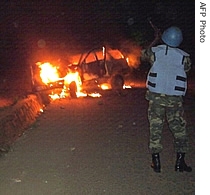Opposition leader Jean-Pierre Bemba, who was defeated by Joseph Kabila in the presidential race last year, called for a day of mourning and a so-called dead-city protest. But many people still went to work, while others started their day a little later than usual. Bemba says, officials who used violence to quell the demonstrations over perceived fraud in the recent gubernatorial elections should be held accountable for the nearly 90 deaths. Governor of the capital, Kinshasa, Liwanga Mata, said in a speech that he would not recognize the day of mourning, because he sees it as a defiant act of Bemba's opposition party. Mata says the constitution allows people to protest if they want, but Bemba does not have the right to authorize a national day of mourning. A group allied with Bemba is reported to have led the demonstrations last week, in which government buildings were burned and several police and soldiers were killed. Supporters of President Joseph Kabila's ruling party won nine of the 11 gubernatorial races. Bemba's allies won one seat. The local elections are part of a peace process that began in 2002 following several years of war.
Opposition leaders in the Democratic Republic of Congo have called for a national day of mourning to protest violent clashes last week. Many protesters demonstrating against election-fraud allegations were killed when security forces fired on rioting crowds in several villages. Kari Barber reports from our West and Central Africa bureau in Dakar with additional reporting by Eddie Isango in Kinshasa.

United Nations peacekeepers patrol near a burnt vehicle belonging to UN Mission in the DRC (MONUC) 01 Feb 2007, in Matadi
Related articles
- • Felix Tshisekedi Sworn In as DR Congo President (January 24, 2019)
- • Constitutional Court Declares Tshisekedi Winner of Presidential Election (January 19, 2019)
- • Felix Tshisekedi Vows to Be the President of All Congolese (January 10, 2019)
- • Felix Tshisekedi Elected DR Congo President (January 10, 2019)
- • DR Congo Delays Results of December Election (January 6, 2019)
- • Jean-Pierre Bemba Returns to DR Congo (August 1, 2018)
- • At least 30 dead after massacres in Ituri (March 2, 2018)
- • Botswana Urges Joseph Kabila to Step Down (February 26, 2018)
- • No elections in DR Congo in December without electronic voting machines: INEC (February 13, 2018)
- • US Warns DR Congo Against Electronic Voting for Delayed Election (February 12, 2018)
- • Felix Tshisekedi accuses INEC of illegally prolonging Kabila's mandate (October 24, 2017)
- • DRC Seeks Arrest of Presidential Candidate Moise Katumbi (May 19, 2016)
- • Papa Wemba Is Buried in Kinshasa (May 4, 2016)
- • Papa Wemba Awarded Highest National Honor as Thousands Pay Tribute (May 2, 2016)
- • DR Congo reach final of African Nations Championship (February 3, 2016)
- • Political tensions 'running high' in DR Congo ahead of 2016 elections (October 7, 2015)
- • Rights Groups: DR Congo Must Free Pro-democracy Activists (April 13, 2015)
- • Police Open Fire on Crowd Protesting Election Law Change (January 19, 2015)
- • Etienne Tshisekedi Evacuated to Belgium for Medical Treatment (August 16, 2014)
- • 15 dead in football match stampede in Kinshasa (May 12, 2014)
- • Kerry Calls on Kabila to Honor Constitution (May 4, 2014)
- • Kerry in DR Congo for Security Talks (May 3, 2014)
- • Security Council extends UN mission, intervention force in DR Congo for one year (March 28, 2014)
- • Death toll in Lake Albert boat accident rises to 108 people (March 24, 2014)
- • DR Congo Takes Chairmanship of COMESA at Summit in Kinshasa (February 26, 2014)
- • DR Congo Honors Nelson Mandela, Hero and Model for Humanity (December 6, 2013)
- • Kabila Congratulates Congo Army for Defeating M23 Rebels (October 30, 2013)
- • M23 Rebels Kill, Rape Civilians in Eastern Congo: Human Rights Watch (July 22, 2013)
- • DR Congo Eases Process for Starting a New Business (June 3, 2013)
- • Regional Leaders Sign DR Congo Peace Deal (February 24, 2013)
Tags: |







